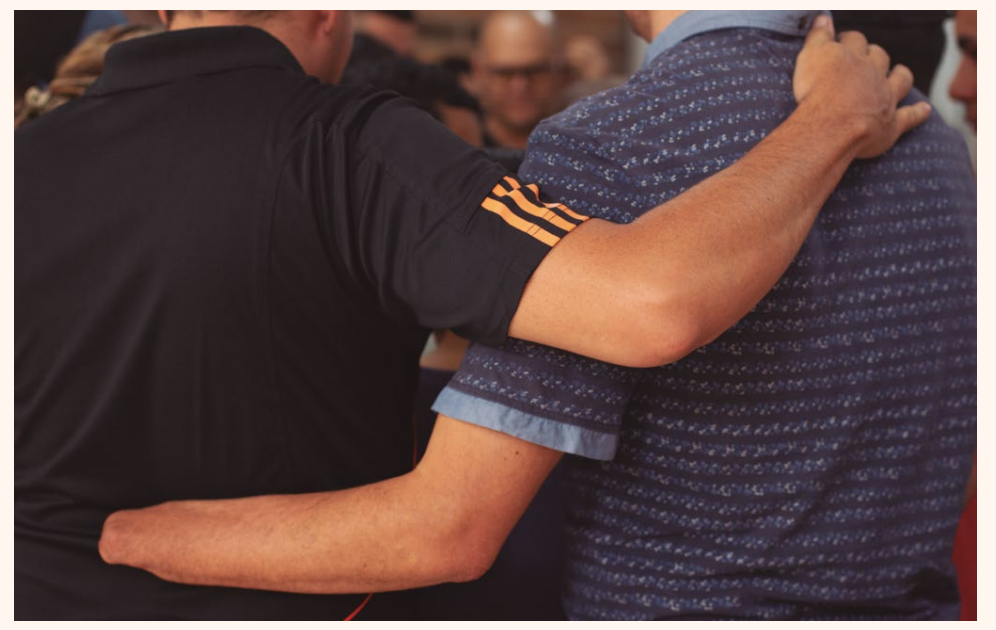Author: Federico Mejía, political scientist, anthropologist and monitoring and evaluation consultant at the Prolongar Foundation
After having completed the first phase of Art to Rebuild, at the launch event of the project’s micro-website, Andrés*, a Person in the Process of Reintegration (hereinafter PPR) who participated in the project, apologized to the audience as a former member of the paramilitaries. After a difficult personal process traversed by anger, he recognized and made public his responsibility.
Although most people in Colombia conceive of reconciliation as a psychological and political process (Rettberg and Ugarriza, 2016), individual and social, it is not easy to understand what manages to cross the inner dimension of people to manifest their transformation in the collective. I want to share then three elements that I consider essential of the process that Andrés lived and that are useful to understand how the actors responsible in the war – who in turn may have been victims at other times – manage to initiate transformations in their lives and offer an act of reconciliation to society; for example, a “pardon.”
1. A time for pain and anger
Although Andrés recognized himself as a responsible actor in the war, his life was marked by pain and anger at the events he experienced in the past. According to Alderdice (2015), reconciliation is usually concentrated in political-economic measures that do not encompass the “unfinished business” of people and their individual transformation. Having caused deep wounds in others, the pain of PPR people can be a great “unfinished business”.
From the beginning of the workshops, Andrés shared the helplessness he felt in the face of the inefficiency of the State, the injustices he had gone through during his life in Urabá and the barriers he currently faces as a PPR. Initially, it was essential to emphasize that despite the difficulties, he could change the way he reacted to situations. While the limitations were real, he was based on the negative and the impossibility. Although it was not easy to contain his claims and feelings, there Andrés was able to express a pain that had not been welcomed and that finally found a safe space to be released. Additionally, since in our work we do not focus on the deeds that people have committed in the past, he did not have to justify his actions and could feel accepted and respected.
Towards the end of the healing stage of the trauma began to take place a change in his perspective. I remember using the act of chewing as a metaphor to refer to the processing of the past. For him, just as chewing something transforms and loses its flavor, so memories and memories at some point stop hurting. With this analogy, Andrés has been able to internalize the following: although what happened is not forgotten, the way we remember it can change. And just as the memory changes, so do we change with it.
2. A time for empathy
“Empathy to revive a lifeless conversation.”
Marshal Rosenberg
In addition to actively participating in the project’s 19 workshops, Andrés was chosen as the only PPR guide to the Encuentros Improbables museographic experience. In total, 10 people prepared through body language and communication sessions to be mediators. While we knew they would convey a message of reconciliation to society, connecting their expertise in Art to Rebuild with a new audience, we didn’t expect this to be a key to bolstering their agency.
During three itineraries, with more than 600 visitors, Andrés was able to express how he saw reconciliation, focusing on his resources, his process and his reconciliation with the other people in the project. In response to his work as a guide, Andrés received messages of empathy that he perhaps did not expect. In these they stressed the courage he had for having decided to go through this process, urged him to persevere and gave him to understand that in society he found support; it was a key moment to understand what he had done and what he could do for the future.
3. A time to be heard
Finally, when Arte Para Reconstruir had finished, Andrés was part of the conversation launching the project’s website. In addition to having been invited for the first time to an event to promote reconciliation, he was in a place that valued his testimony as a contribution to peacebuilding. There, for the first time, he apologized publicly and voluntarily as a former member of the paramilitaries: it was his way of offering something to society and deciding on a different path. So, in addition to finding a place for pain and empathy, I would like to emphasize that he needed an audience willing to listen to him, without the objective of judging.
As Andrés says, “when you do not encounter obstacles, nor stigmatisms, nor accusations from society, from other people, because that also helps you to forgive yourself and heal internally.” Sometimes, as a society, we forget that we inhabit a transitional scenario that is full of tensions and fears, which hinders the possibilities that the actors responsible in the war have to accept and remedy the actions they have committed. Therefore, while we legitimately expect ex-combatants to assume their responsibility in promoting reconciliation, it is necessary to create safe spaces for dialogue, free from the dynamics of stigmatization and antagonism promoted by the armed conflict.
* To protect the identity of the PPR participant, the following text makes use of a pseudonym chosen at the discretion of the author.
References and bibliography

No comment yet, add your voice below!